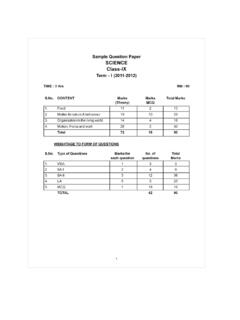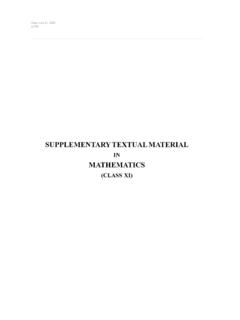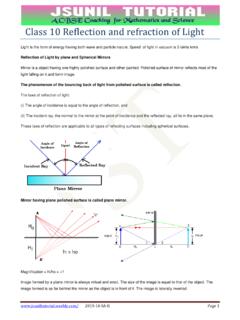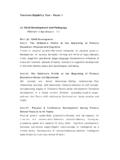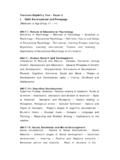Transcription of CTET/ TET CHILD DEVELOPMENT AND PEDAGOGY Solved …
1 CTET/ TET CHILD DEVELOPMENT AND PEDAGOGY Solved question Paper - 6 Page 1 1. You find a student to be intelligent. you will (a) Remain pleased with him (b) Not give him additional homework (c) Motivate him so that he can make more progress (d) Inform his parents about the fact that he is intelligent 2. If some students are not in a mood to study in the class, you will (a) Force them to study (b) Tell those students to leave the class and enjoy (c) Warn them that they must study else you will report the matter to the Principal (d) Tell them some interesting things related to their interests or your own subject 3. CHILD DEVELOPMENT is defined as a field of study that (a) Examines change in human abilities. (b) Seeks to explain behaviour across the life span.
2 (c) Compares children to adults to senior citizens. (d) Accounts for the gradual evolution of the CHILD 's cognitive, social, and other capacities. 4. The term identical elements is closely associated with: (a) Group instruction (b) Transfer of learning (c) Jealousy between twins (d) Similar test questions 5. Organism theories of DEVELOPMENT hold that (a) Psychological structures and processes within the CHILD help determine his/her DEVELOPMENT . (b) Physical structures and processes within the CHILD help determine his/her DEVELOPMENT . (c) Passively developed structures and processes within the CHILD help determine his/her DEVELOPMENT . (d) Slowly developed structures and processes within the CHILD help determine his/her DEVELOPMENT . 6. A Person believes that nurture strongly influences the DEVELOPMENT of his CHILD .
3 He would not agree With the importance of: (a) Genetic factors. (b) Exposure to peers. (c) The types of toys at home. (d) The warmth displayed by the parents 7. If student is too shy to participate in the class, you will (a) Not ask questions from him (b) Ask only those questions from him whose answers can be given by him (c) Not ask those questions from him whose answers are beyond his means and due to which, he may become objects of ridicule in the class. (d) Ask questions from him only when he is keen to answer them CTET/ TET CHILD DEVELOPMENT AND PEDAGOGY Solved question Paper - 6 Page 2 8. How will you bring a hyperactive CHILD (who is always keen to break articles) on the right path? (a) Make him sit in front of the class and keep a strict vigil on him (b) Allocate a seat for him in a corner of the class (c) Give him tasks of watering trees, cleaning the blackboard, making toys of clay etc.
4 (according to his tastes/ aptitude) (d) None of above 9. Knowledge of CHILD psychology is a must for a primary teacher. That is because (a) It helps in making children disciplined (b) the examination result is improved (c) It becomes a convenient mode for motivating children (d) It helps the teacher in understanding the behaviour of children 10. The current movement of behaviour modification, wherein tokens are awarded for correct responses, is a reflection of: (a) Herbart s Five Steps (b) Lock s Tabula rasa (c) Thorndike s Law of Effect (d) Thorndike s Law of Exercise 11. The current view of childhood assumes that (a) Children are similar to adults in most ways. (b) Children are best treated as young adults. (c) Childhood is basically a "waiting period.
5 " (d) Childhood is a unique period of growth and change. 12. In preparing a fifth grade class to take a standardized reading test the teacher is best advised to: (a) Tell the children the test is very important and they should do the best they can (b) Ditto key questions from a previous test and allow the pupils to answer them (c) Coach the below grade level readers, as the rest of the class will do well anyway (d) Give the pupils practice in answering questions similar to the type that will appear on the test 13. A normal CHILD of twelve years of age is most likely to (a) Have difficulty with gross motor coordination (b) Have feelings of anxiety about pleasing adults (c) Confine his/her interests to here and now (d) Be eager for peer approval CTET/ TET CHILD DEVELOPMENT AND PEDAGOGY Solved question Paper - 6 Page 3 14.
6 Creative writing should be an activity planned for (a) Only those children reading on grade level (b) Only those children who can spell and also, can write cohesive sentences (c) Only those children who want to write for the newspaper of the class (d) All children 15. Of the following, the most promising step for a teacher to take in order to improve class discipline is to (a) Note specific infractions of class rules in the marking book (b) Evaluate his/her materials, methods and approaches to children (c) Consult the class and agree upon a graduated series of punishments (d) Call a parent teacher meeting to discuss the situation ANSWERS: 1. (C) 2. (d) 3. (d) 4. (b) 5. (a) 6. (a) 7.
7 (d) 8. (C) 9. (d) 10. (c) 11. (d) 12. (d) 13. (d) 14. (d) 15. (b)
